10 Best Kitchen Knife Brands
Table of Contents
Finding The Best Kitchen Knife Brands
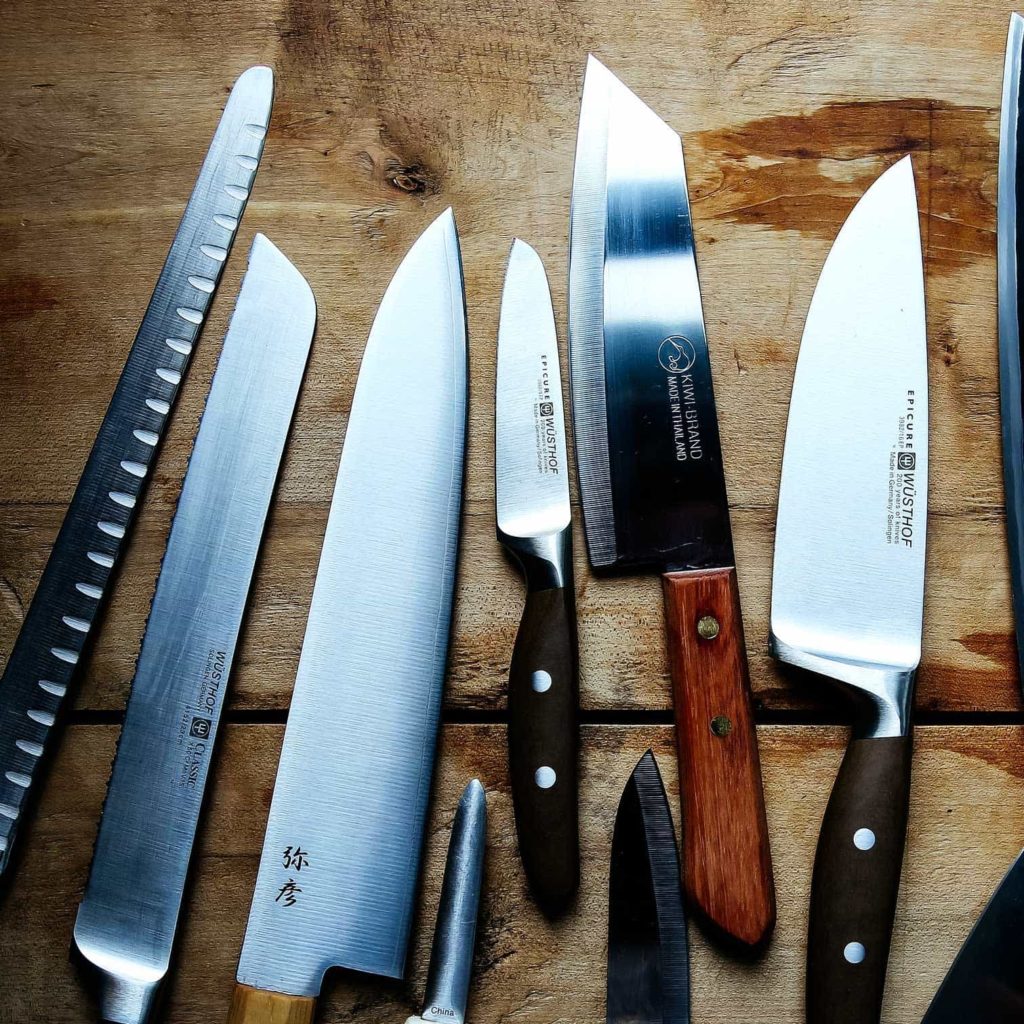
Whether you’re a timid home chef in training or a speedy, knife-wielding pro, the right tools can go a long way in the kitchen. Dull knives cause messiness and slow down prep work, and believe it or not, can affect the taste and enjoyment of your finished product.
In addition to introducing some of the best-made knives on the market, we put together this Best Kitchen Knife Brands list to encourage you to feel a little more knowledgeable about the world of blades. And, to help you improve your overall cooking experience.
After we fill you in on some of the best brands on the market, you’ll read about some important things to consider when shopping for knives. We’ll also go over some foundational information about the most common types.
But first, we’ll go over why you may want to consider a quality kitchen knife and what it means for your culinary journey.
Why You Need the Best Kitchen Knives
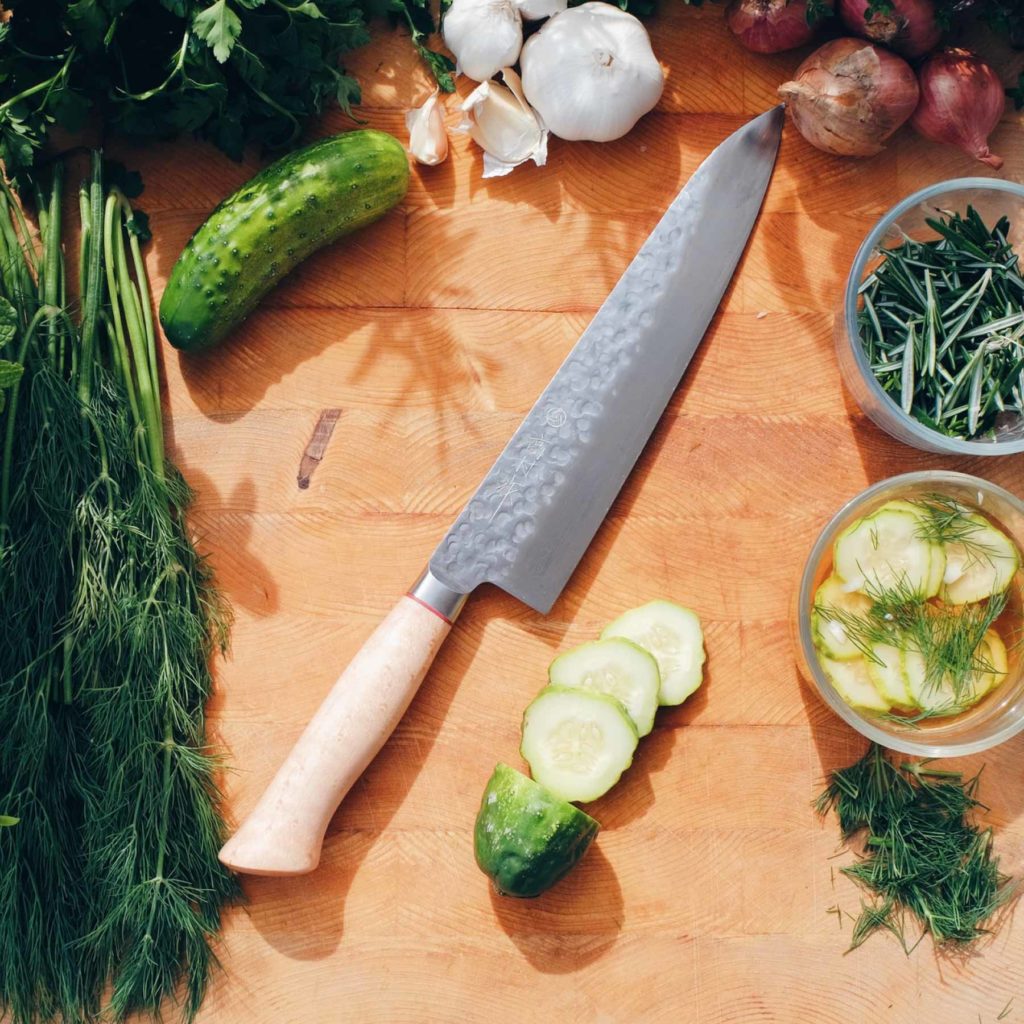
Regardless of whether you’ve ever stepped foot in the kitchen to prepare a meal, there’s a good chance you’ve come face-to-face, or rather, hand-to-blade, with a knife that just wasn’t getting the job done.
Perhaps you struggled using a straight-edged blade to slice a crusty loaf, or massacred your steak with a regular table knife. Whatever it was, you may know the importance of using the right knife, but don’t have the first clue about how quality comes into play.
The art of home cooking is becoming more popular than ever, and more and more people are noticing the difference a quality knife has in their cooking experience—whether that’s for themselves or for a group of family and friends.
Helping to speed up the job, make it easier, or enable you to experience different types of cooking, the right knives have a huge impact on what and how you eat.
Rewind 20 years ago and quality knives were something reserved for professional chefs. Today, anyone can own one and act like a pro in their own kitchen.
10 Best Kitchen Knife Brands
Ahead, you’ll find our top 10 picks for the Best Kitchen Knife Brands on the market. We’ve made sure to include a spectrum of brands, so be sure to keep an eye out for what makes each one unique.
1. Our Place Everyday Chef’s Knife
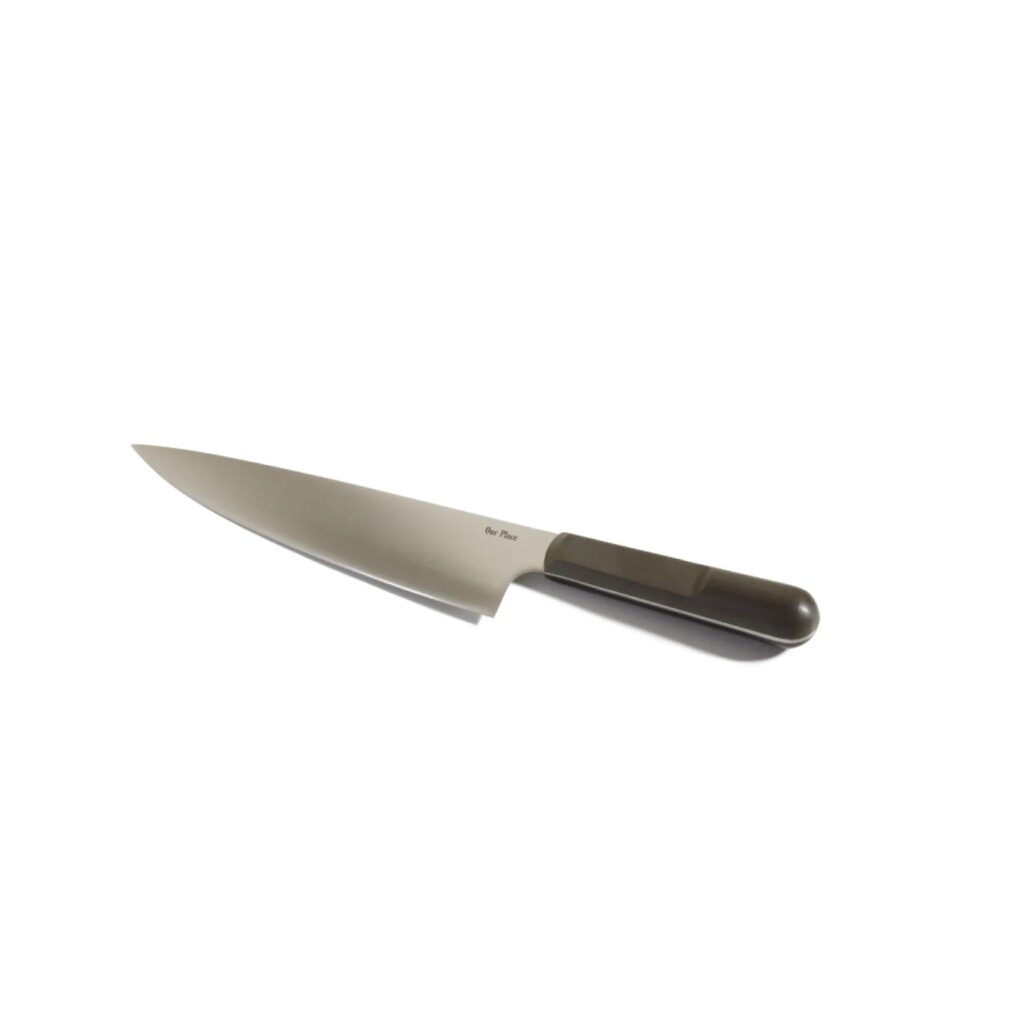
The Chef’s Knife from Our Place, a culinary masterpiece designed to revolutionize the way you chop, slice, and dice in the kitchen. Crafted with precision and passion, this knife is the ultimate tool for every home chef, combining cutting-edge technology with timeless craftsmanship.
Engineered for excellence, the Chef’s Knife boasts a razor-sharp blade made from premium German stainless steel, ensuring unparalleled sharpness and durability. Its ergonomic handle provides a comfortable and secure grip, allowing for effortless maneuverability and precise control with every slice.
Whether you’re tackling delicate herbs, hearty vegetables, or succulent meats, this versatile knife delivers flawless performance, effortlessly gliding through ingredients with ease. From meal prep to gourmet cooking, it’s the perfect companion for all your culinary adventures.
Elevate your cooking experience and unleash your inner chef with the Chef’s Knife from Our Place. With its unparalleled quality, performance, and style, it’s sure to become an indispensable staple in your kitchen arsenal.
Pros
- Premium Materials: Crafted from high-quality German stainless steel, ensuring long-lasting sharpness and durability.
- Versatile Design: Suitable for a wide range of kitchen tasks, including chopping, slicing, and dicing various ingredients.
- Ergonomic Handle: Features an ergonomic handle design for comfortable and secure grip, reducing hand fatigue during extended use.
- Precision Cutting: Razor-sharp blade delivers precise and effortless cutting, allowing for professional-level results in the kitchen.
- Stylish Aesthetic: Sleek and modern design adds a touch of elegance to your kitchen countertop, making it both functional and aesthetically pleasing.
Cons
- Price: The premium quality of the Chef’s Knife is reflected in its price, which may be considered relatively high compared to other options on the market.
- Single Purpose: While versatile, some users might prefer a knife with additional features or specialized designs for specific tasks.
- Availability: Depending on demand and stock levels, availability may vary, potentially leading to wait times for purchase or delivery.
2. MAC Knives
MAC Knives is a brand with Japanese tradition that has transformed into a well-known Western favorite. Founded by Mr. Tatsuo Kobayashi in 1965, the brand is revered for its professional look and feel, as well as its superior craftsmanship.
With over 25 million knives sold, MAC Knives has been on a mission for over 50 years “to create Salter, sharper, lighter, and more comfortable knives.” In its collection, you’ll find Western-inspired Japanese blades, along with sharpeners and accessories like cutting boards.
MAC Knives’ Western blades have a Rockwell hardness of 58-60, but the brand includes a ton of other series from Japanese traditional to those made of Damascus steel. Its blade-making process is done completely by hand from grinding to sharpening and promises razor-sharp edges that stay sharp longer than other brands do.
These claims are backed up by customers, as well as publications like the New York Times, who say they’re agile, comfortable, and extremely sharp. If your blade does happen to falter, it comes with a 25-year warranty that covers defects in materials and workmanship.
Pros
- Wide variety of knives to choose from
- Known for its sharpness & durability
- Extremely hard
- Hand-finished
- 25-year warranty
Cons
- Hardness may mean they chip more easily
3. J.A. Henckels
Perhaps one of the most popular companies on this Best Kitchen Knife Brands list, J.A. Henckels makes high-quality German knives that are enjoyed by people around the world. Establishing the Zwilling trademark back in 1731, the knife brand has been forging blades using high-carbon stainless steel since its inception.
Throughout the years, J.A. Henckels became an umbrella of brands, including Staub, Ballerini, and a few other well-known names. Though its specialty is knives, its selection includes cutlery, cookware, electrics, and even tabletop products.
Regarded as a value brand, with sharp edges and comfortable handles, you’ll find an affordable range of prices for its quality products.
The brand offers quite a variety of blades, including ice-hardened and those that use one-piece forging. Shoppers can enjoy the general variety of styles from bread to paring to chef knife sets.
All made in Germany, J.A. Henckels knives get high star ratings from customers on Amazon and come with a lifetime warranty against defects and workmanship.
Pros
- Affordable quality
- Internationally trusted name
- Wide range of styles and blades
- Lifetime warranty
Cons
- Not as high in quality as high-end brands
4. Misono
If you like the intimacy and reliability of small businesses, try Misono. Founded in Japan in 1935, the brand is family-owned and run. In its early days, it specialized in vegetable peelers.
The brand is Japan’s oldest Western-style blade company, creating 150,000 knives per year from just 50 employees. In terms of its knives, Misono aims to create “long-lasting edge retention for professional use” by way of hard steel and hand-finished touches.
Offering knives and accessories for Japanese cuisines, like sushi and ramen, the brand makes just seven knife styles with a few varieties and sizes per category.
You’ll find all of the most popular Western styles of knives in Misono’s collections, including chef knives, paring, and Santoku, all of which are either made of molybdenum steel or Swedish carbon steel. But, they have Japanese touches that give them a sleek, professional look.
In general, users rate its knives at 5/5 stars and report that they’re extremely sharp out of the box and very well balanced. Prices are on the more affordable side—offering an 8-inch carbon steel blade for $130.
We didn’t come across any warranty information on the brand’s website or off.
Pros
- Smaller company that focuses on craftsmanship
- Hand-finished
- Mid-priced
- Very sharp & hard
Cons
- Fewer knife choices
- No warranty information
5. Shun
Shun knives started with the Kai Group. Founded in 1908 by Saijiro Endo in Seki, Japan, the brand got its start making a few different types of cutlery for the Asian market. In 2002, it introduced them to the Western market.
Shun believes that “the blade is more than a tool; it’s a tradition.” Whether it’s a samurai sword or a steak knife, a blade is something to be admired and requires thought and quality craftsmanship.
Shun’s mission is to maintain “ancient tradition by continuing to handcraft each knife in our Seki City facilities”—the birthplace of Japanese bladesmithing. Every single piece of cutlery that the brand produces goes through over 100 steps, preserving tradition and honoring the craft.
The brand showcases its many awards for several of its knives, showing just how high quality they truly are. Specializing in blades, the brand offers a small collection of knives, sets, and accessories like cutting boards to go with them.
Since the brand offers several series of blades, we decided to take a closer look at its Dual Core series to get some specs on its materials and features.
Using VG10 Steel, these knives are described as having “a complicated blend” of chromium, manganese, molybdenum, silicon, and vanadium; these blades are incredibly strong and come with a lifetime warranty.
On its website, most products show a 4.5-5/5 star rating, and in general, customers say that Shun is a respectable brand and one of the best in the world.
Pros
- Small selection but great focus on quality
- Said to be one of the best brands in the world
- Superior craftsmanship
Cons
- Limited selection
- Expensive
6. Mercer Culinary
Specially crafted for the foodservice industry, Mercer Culinary is all about performance. Geared towards helping professional chefs, mixologists, and everything in-between, the brand is known for its excellent craftsmanship and durable products.
Founded by Jim Wallick, Mercer aims to “make your job more enjoyable, easier, and more efficient,” and since this is a Best Kitchen Knife Brands list, we found that its knife selection includes several different collections, like Renaissance, Genesis, Millenia, and more. One thing that stood out about this brand was its aesthetics.
Compared to other companies on this list, Mercer offers the most in terms of design and color. Pick its all-white collection to match a cream kitchen, or introduce a little pop of color to brighten things up.
Because each of its knife collections is so diverse, we decided to take a closer peek at its Renaissance line to see what makes it so special.
Made from high-carbon, German steel, Mercer Renaissance knives resist rust and corrosion, are triple-riveted, and boast incredible balance. Its Millenia collection takes inspiration from Japanese knives, offering an extremely sharp edge, and easy sharpening.
Customers rate Mercer knives highly, noting their sharpness and superior cutting ability.
The brand’s collections come with a lifetime warranty that backs defects in terms of materials and workmanship under normal use.
Pros
- Offers both German and Japanese styles
- Aesthetically-pleasing
- Known to be very sharp
- Lifetime warranty
Cons
- Limited selection
7. Imarku
Designed for professionals, Imarku first came on the culinary scene about 13 years ago. There’s another brand named Imarku with a longer history created in Germany, but the one we’re featuring in this Best Kitchen Knife Brands list was founded by Mark Liu, although we couldn’t find exactly where but it appears to be in the US.
Its knives take over 45 days to craft using high-carbon 7cr17mov stainless, German steel, even though the styles of knives border on the Japanese, and that’s where Liu did his training. The brand says it uses this steel because it contains double the carbon content of other steels and it has incredible balance.
Imarku’s inventory showcases professional chef knives, steak knives, and Japanese knives, but you’ll also find cookware on its website as well.
Within its lineup of knives, lies all the most popular styles, including butcher, sushi, boning, etc. And, you can buy 4-16 piece sets for your professional collection.
The brand uses a few different styles of handles, some ergonomic, some made from gorgeous Pakkawood. Claimed to retain balance, durability, and sharpness, Imarku knives are thick, tough, and affordable—its 8-inch Chef Knife ($40) got 4.7/5 stars from over 7.8k customers on Amazon.
Pros
- Affordable
- Lots of sales
- Uses German steel
- Money-back guarantee
Cons
- Small inventory
- May be mistaken for the other brand of the same name
- Short warranty
8. Wüsthof
Wusthof was founded in 1814 in Germany, if you can’t tell by the name, but in Solingen to be more exact. Passed down through Wusthof family generations, its knives are still made in the very place they were created—the steel manufacturing capital of the world.
Holding incredible significance of quality, knives that bear the ‘Made in Solingen’ mark are regarded as some of the best on the planet.
Wusthof offers hundreds of versions of knives within its categories of recognizable names like Chef and Carving. Within those categories, you’ll find many different styles of handles and blades, some showing serration, others, a straight edge. You can shop by a particular style, so if you want a certain color for your kitchen, you’ll be able to isolate that and shop the look.
Wusthof knives are moderately expensive, but the company is known for its awesome sales. When on sale, the knives cost around $150. The brand also has a Speciality knife section, and we’ll take a second to linger on it to show you what they’re made of.
Crafted from chrome molybdenum vanadium steel, Wustoff Speciality knives feature 58 blade and 104 surface Rockwell hardness. The handles are where these blades shine though, made from 3,249-year-old Bog Oak coated in Diamond-Like Carbon (they even come with a certificate of authenticity).
For its other knives, the brand actually uses a precision laser by way of a computer to form their edges—which take 14 steps to get to the desired result. The laser ensures the knives are 20% sharper than what a regular knife would be, and they boast double the retention.
Laser-cut blades are made from high-carbon stainless steel and are more moderately priced than the forged knives Wusthof makes which take 40 steps.
Covered under a lifetime warranty, the general perception of the brand is that they really are all their cracked up to be—holding an edge, being well-balanced, sharp, elegant—even Gordon Ramsey uses them in his online cooking course.
Pros
- More affordable options thanks to laser cutting
- Offers different varieties = more options for customers
- Offers German and Asian-inspired styles
- Used by Gordon Ramsey
Cons
- More expensive than some brands
9. Tojiro
Made in Tsubame-Sanjo, Japan, Tojiro specializes in supremely sharp blades. The brand uses four principles as its guiding light—good faith, sincerity, appreciation, and creation.
Founded in 1953 by Susumu Fujita, the company began as a farm equipment business that made machine parts and blades for tractors. It was just two short years before it began making cutlery, and thank goodness they did, because today, they’re loved by professionals and home cooks around the world.
Believing that sharpness is the most important aspect of a knife for cooking, Tojiro chooses only the best raw material to start its blades with. Then, its team pours in expertise and the family’s traditional blade-making technique.
Within its collections, you’ll find beautiful Western, Japanese, and Chinese-style knives, with over 400 styles and sizes within those categories.
Offering blades made of VG10, Molybdenum, Powered high speed steel, Nickel Damascus, and other materials, you’ll have a wide range to choose from to suit your personal preferences in terms of hardness and design.
As for the handles, you’ll find metal, wood, or resin, and we like that the brand’s website gives shoppers the options to search by material or series. Even though you can search, you won’t be able to purchase from the site, but you can find its knives on Amazon or in cooking supply stores.
Speaking of Amazon, we checked out the ratings for the DP Gyutou Knife and found a 4.7/5-star score from 192 buyers. And wherever you purchase your Tojiro, it will come with a lifetime warranty.
Pros
- Moderately priced
- Hundreds of styles & sizes
- Offers Japanese, Chinese & Western knives
- Clearly outlines stats, like layers of steel, on website
- Superiority sharp
- Lifetime warranty
Cons
- Cannot buy from the brand’s website
- Does not mention hardness
- Does not list where its knives are sold
10. Victorinox
The original inventor of the Swiss Army Knife, Victorinox is a Swiss brand founded back in 1884. Over the years, the brand adapted to become one more about a certain lifestyle, introducing watches, travel gear, and fragrances to its collection of quality knives.
Offering a wide spectrum of blades, the brand tells its customers that each one will be different in terms of strength, but they’re all guaranteed to perform to the highest ability. The brand makes its knives from stainless steel, which BBC Good Food reveals usually isn’t a good pick for sharpness—except when used in Victorinox knives.
Though you can slice a pepper with a Swiss Army Knife, since this is a Best Kitchen Knife Brands list, we’ll be focusing on its kitchen knives. With an expansive selection, you’ll find over 60 knives within its Chef Knife category alone, as well as hundreds of others through categories like Santoku, bread, and paring sections.
Unlike most other brands on this list, you can’t buy Victorinox knives from its website. Instead, you’ll need to search for retailers who do. According to over 11k customers who bought a particular style of the brand’s knife, it’s pretty much perfect, is very sharp, and is of high quality.
We were unable to find any warranty information listed on the brand’s website for its knives, but we did come across a lifetime warranty for its Swiss Army Knives.
Pros
- Very high quality
- Trustworthy brand
- Wide selection
- Swiss-made, known for sharpness longevity
Cons
- Cannot buy directly from brand’s website
- No warranty information given
How to Choose the Best Kitchen Knife Brand
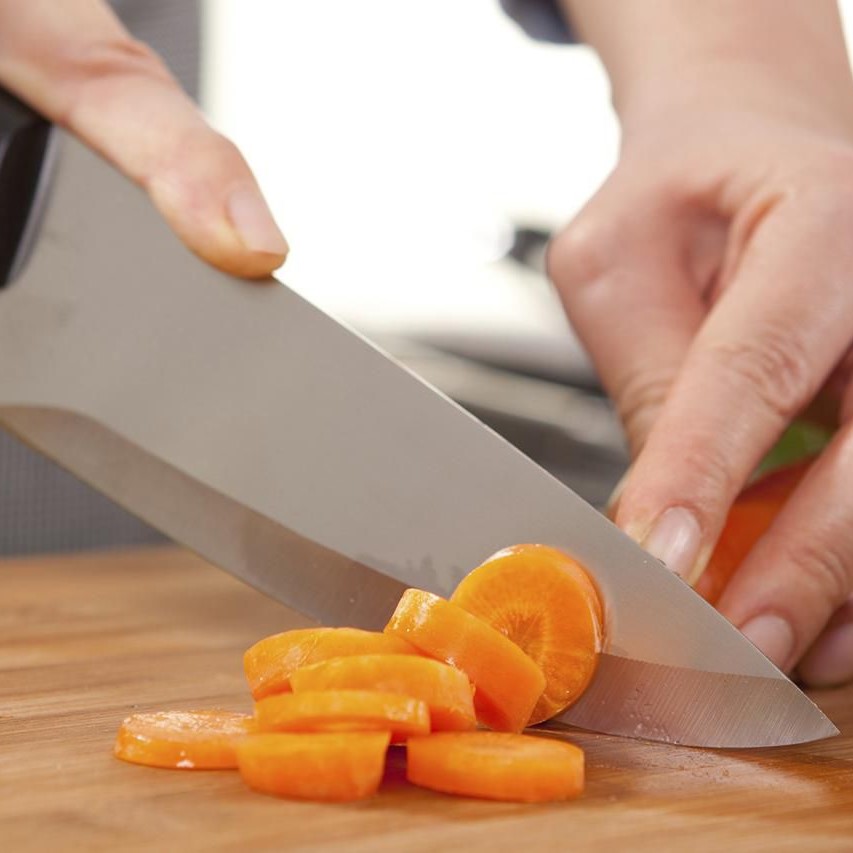
Like many things in this world, choosing a kitchen knife is personal. There are pros and cons to every single material, style, and length out there, so it’s important for you to identify your needs before you start shopping.
Typically, the most popular types of kitchen knives are German and Japanese. You may have noticed that the brands we featured in this Best Kitchen Knife Brands list generally side with one or the other, although some stock both kinds.
In this section, we’ll fill you in on what you can expect in terms of material, blade, and edge of both the German and Japanese variety, along with a few other details that may sway your decision one way or the other.
German Knives
German knives are associated with substantial weight and thicker blades. Normally, they have a more rounded edge, are suited for the rocking, and are loved by chefs for their versatility in the kitchen.
They can withstand the pressure of difficult jobs like separating a whole chicken or slicing through a ligament, as well as finer tasks like dicing herbs.
German knives have an angle of 20-22 degrees and an average weight of about 9 oz for an 8-inch knife, which they can thank the thicker blade and heavy bolster for. As for the construction, you can expect these blades to be softer—about 56-58 on the Rockwell scale.
Lengths vary, but the most common German knife is about 8 inches.
Japanese Knives
Japanese knives are precise and have an acute angle of 12-15 degrees. They’re incredibly lightweight and known for their thin construction and bolster-free design. Weighing in at about 5.5 oz for an 8-inch knife, Japanese blades are hard—about 60-61 on the Rockwell scale—and loved for how long they can go between sharpenings.
But, this hardness may also lead to more frequent chipping, so just be sure to handle your blade properly. To sharpen your Japanese blade, a whetstone is required, and you’ll need to follow a special technique as they only feature an edge on one side.
Use your Japanese knife for jobs that require precision. Stay away from jobs with bones and leave that to their German friends.
Things to Consider When Shopping for the Best Kitchen Knives
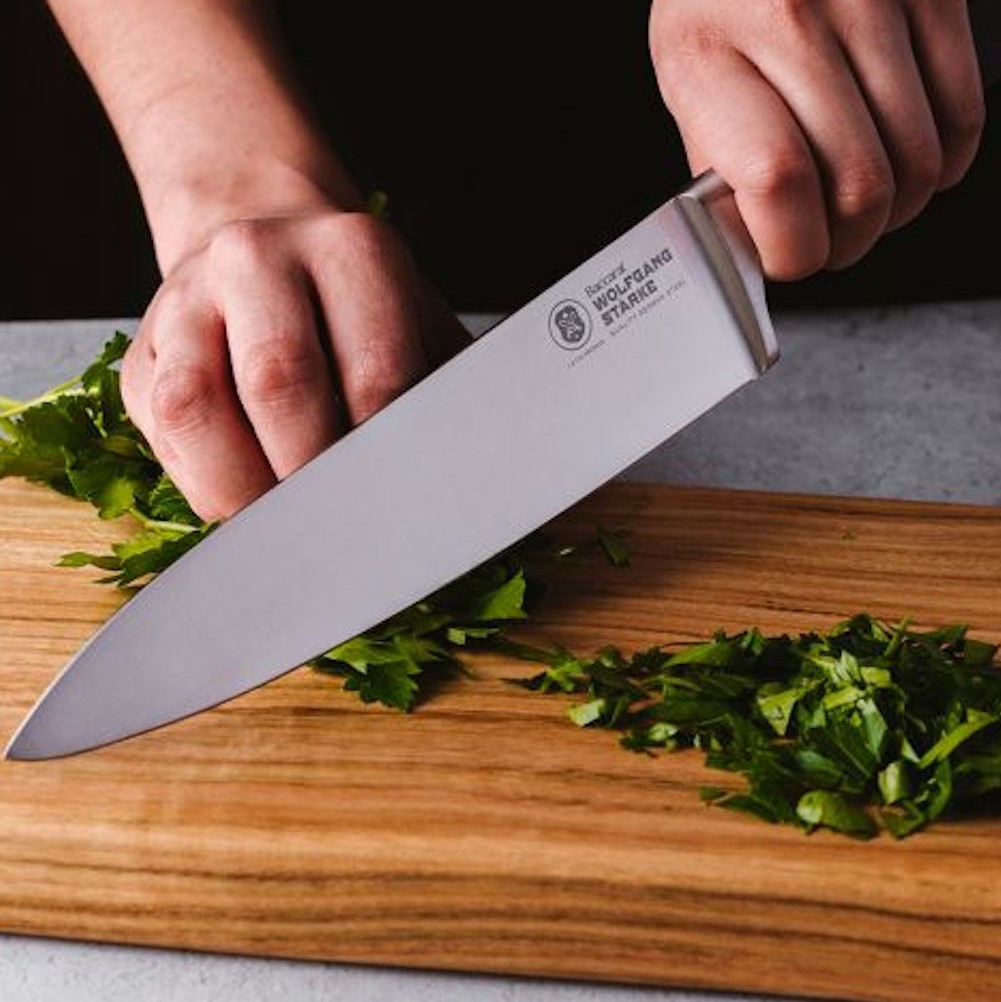
Shopping online for the Best Kitchen Knives can be tricky, but we hope this list serves you well. In addition to introducing you to some of the most popular brands out there, we also wanted to point out what to look for when choosing the right knife for your kitchen.
Just like food, knives are personal, and if you’ve learned anything from this Best Kitchen Knife Brands review, then we hope it’s how differing knife brands and types can be.
When choosing one to suit your preferences, needs, and tasks, it’s important to consider the material it’s made from, how it will feel in your hand (balance), and what kinds of foods you prep in your kitchen. We’ll cover all of those topics below in more detail to help you better understand what to look out for.
Blade Material & Features
There are a ton of materials to make a knife from, but usually, brands go with something that can withstand constant use and holds up to pressure well. You’ll find that certain knives that are made for specific purposes will use special materials to handle the tasks they’re designed for. For example, a boning knife needs to be flexible, while a paring knife shouldn’t be.
The most common materials for knives to be made from are either stainless steel or carbon steel. These materials are preferred for kitchen use, are generally more affordable, and are easy to use and clean.
You may encounter chef knives made from ceramic or cleavers made from titanium, but in the end, these materials have been chosen because they aid in each knife’s particular purpose.
Aside from materials, certain knives also feature hollows or holes and extremely sharp or pointed tips. While holes allow for less friction, pointed tips are ideal for stabbing tough foods like meat and, in general, make the cutting process that much easier.
Edge
The edge is the sharp, bottom point that runs along the underbelly of your knife, while the spine is the flat, dull top. You can press your hand safely on the spine of your knife, but you should never touch the edge.
Depending on the knife’s style, it may have a straight edge on one (single edge) or both (double edge) sides. Certain styles, like bread knives and steak knives, feature a serrated edge that helps saw through tough materials.
Along with the type of edge, certain knives may have different sharpnesses to tackle specific jobs. Separating flesh from bone requires an incredibly sharp edge, which is why you’ll find exacting sharpness to be one of the defining features of a boning knife.
Forged vs Stamped
Knives can be either forged or stamped. Depending on who you talk to, some will say one is better than the other. Forging is the more traditional practice of blade-making, while Stamping is a modern-day method.
If you’ve ever seen the hit TV show Forged in Fire, then you’ve seen the exhausting, hot process that goes into making just one blade. If not, then all you need to know is that it’s a fine art that involves crafting a blade out of a single piece of steel that is then heated and pounded with a hammer to shape and strengthen it.
Think of stamped knives how you would cut out cookies. The knife shape is cut out of a larger sheet of steel, or other metal, then shaped and sharpened into the final product.
Forged knives are typically regarded as stronger, but the process to make them is quite tedious. Stamping allows for faster and greater production, often meaning that the blades, though made of high-quality materials, can be sold for less.
Weight, Balance & Control
Hold anything in your hand and if one end is heavier than the other, the item will pull in that direction. Using an imbalanced item can lead to a heavy motion in one specific area.
For example, think of a hammer. Though no knife will ever be balanced like a hammer will, as you can imagine, if one end is heavier than the other (ie. handle) the cutting motion will be thrown off.
A high-quality knife will have a perfect balance of blade and handle, leading to a steady and even slice or chop. A few things will affect the balance of your knife, and one of the most important is its tang. The tang is what the knife’s handle will wrap around, and it’s important to get this feature perfect to create a steady balance.
Another, lesser-known factor that affects your knife’s balance is its distal tapering. This fancy-sounding name simply refers to the thinning of the blade from tip to base.
And last but not least, you have the bolster. The bolster is what gives your knife integrity, but also must be an ideal weight to create balance.
Handle
Although the look of a handle may be why you choose a particular knife, its material and construction are what you should really take into consideration. When reading through this list of the Top Kitchen Knives, keep an eye out for handles that conform to your hand or are made from durable materials.
Depending on the material, your hand will grip the knife in a certain way. Some are curved to fit your hand, while others are smooth—which you choose is usually a matter of preference.
Traditionally made with bone or wood, today, handles can be made of a wide variety of materials, including carbon fiber, titanium, fiberglass, and even plastic. What the handle of your knife is made from greatly dictates the price and weight of the overall item.
For example, bone would be more expensive and heavier than a knife that’s handle is made from plastic.
Common Types of Kitchen Knives
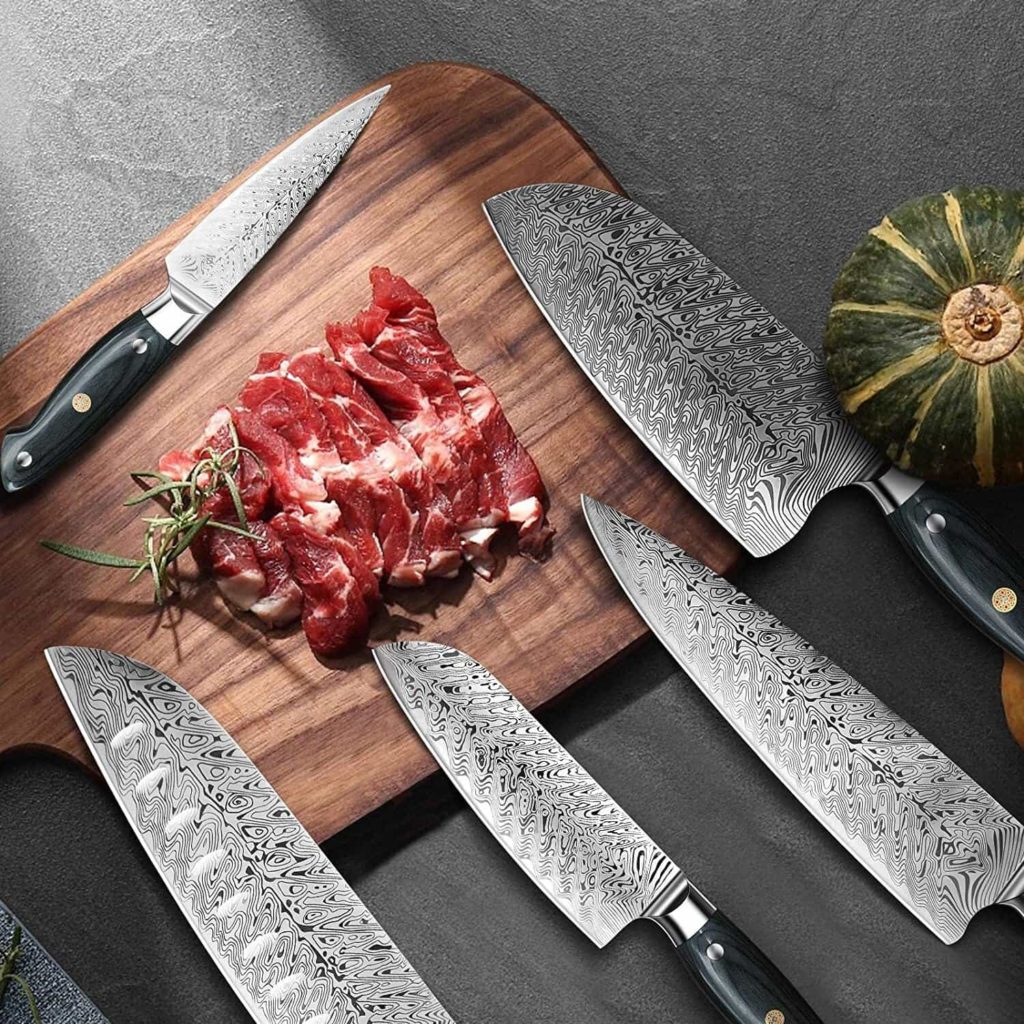
Textures of foods are incredibly different. Just like you wouldn’t use a butter knife to try and slice a steak, the knives involved with the preparation of vegetables, starches, and meats are specifically made to properly handle each one.
From slicing to chopping to sawing, knives feature different edges, are made of special materials, and come in particular lengths.
Now that you’ve read what our picks for the Best Kitchen Knife Brands are, we’ve included a little more information on what the most common types of kitchen knives are to help you figure out which ones you may want to include in your own kitchen.
Chef Knife
Ever seen a pro chef whiz through a heap of herbs or julienne a row of multi-colored peppers? They were probably using a Chef Knife. With a curved edge, it was designed for chopping vegetables.
Chef knives can be made from a few different materials—carbon steel, stainless steel, or ceramic. With the greatest range of sizes, these knives can be as short as 6 inches or as long as 14.
Santoku Knife
Don’t be intimidated by this knife’s name, although it’s a serious kitchen tool, it’s one that many cooks find incredibly useful in the kitchen. Translated from the phrase “Santoku bocho,” which in Japanese means “three knives,” this multi-purpose prep tool is suited for mincing, slicing, and dicing vegetables.
With a straight edge and narrow blade, the Santoku knife is made from stainless steel, but you may also find it made from carbon steel or even ceramic. Typically a stronger blade than others, this one measures about 6 inches, is durable, and is known to stay sharp longer too.
Paring Knife
If you’re a casual home cook, you may not be familiar with the paring knife, and yet, it’s a useful tool for chefs of all levels—even if you’re simply a self-proclaimed one. Used to chop or slice small tasks, these non-serrated, 3-4 inch knives are ideal for jobs where you need a little more precision.
They’re made from either forged steel or stainless steel, and experienced cooks recommend choosing one with a handle made from resin or another sturdy material other than plastic, as it tends to break easily due to the type of task performed.
Bread Knife
If you’ve ever tried to slice a crusty loaf with a steak, dinner, or chef’s knife, then you know how important a proper bread knife is. Measuring 8-11 inches, it needs to be a few inches longer than a loaf is wide to get a proper sawing cut.
Bread knives almost always have a wide, serrated edge that makes getting through soft rolls and chewy bagels equally as easy, although a little sawing will always be required. Made with carbon steel or stainless steel, the material of these knives isn’t too important as they’re made to deal with soft foods.
Utility Knife
This particular type of knife is incredibly versatile. It can be used in the kitchen, then tucked in your pocket and taken camping—that is, if it’s foldable.
In the home, utility knives are ideal for tackling smaller tasks like baby potatoes or cutting the string off a whole, tied chicken. It typically measures about 4-6 inches total, and what it’s made from usually depends on the brand. Most choose high-quality steel, and you’ll find a harder edge geometry that’s specially designed to help the blade withstand chipping.
Boning Knife
The boning knife is another that’s name is pretty self-explanatory. With a thin and flexible blade, it’s perfect for separating bone from flesh, easily slicing ligaments and tough tissues.
Measuring about 5-6 inches in length, this blade is known for its sharpness and is handy to keep in the kitchen for households who usually deal with whole chickens or fish.
Cleaver
A cleaver is what you might envision a psychopath wielding in your scariest of nightmares. Typically measuring 10-12 inches total, it’s an excellent tool for chopping through tough jobs (like bone) and has been the choice knife of butchers across the globe for centuries.
Usually made of iron or carbon steel, this chopper needs to be tough enough to withstand a ton of heavy work without the chance of it cracking under the pressure, and sharp enough to slice through solid materials.
Many butchers also use the flat side as a mallet to tenderize meat, making it an incredibly versatile knife that’s a must-have for households that eat a lot of meat—and normally enjoy it with the bone in.
Final Thoughts
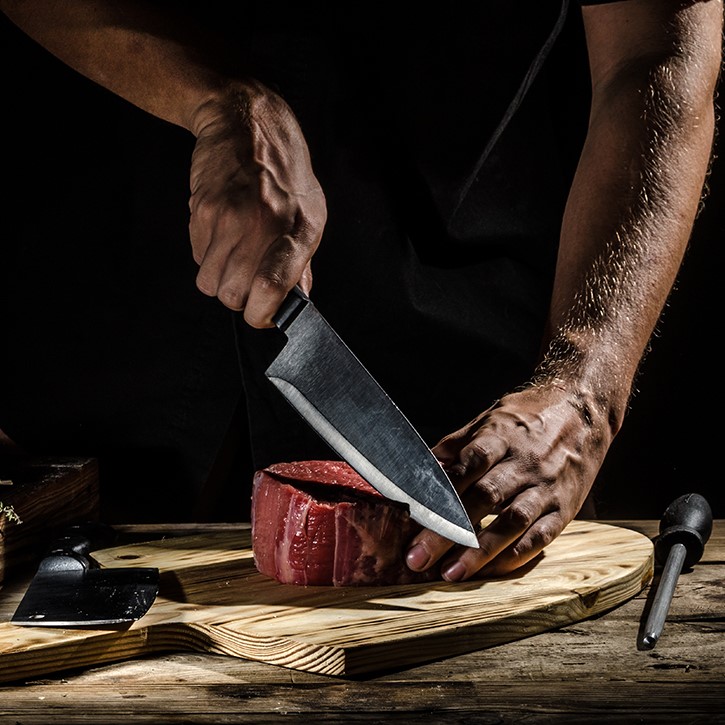
We hope you feel a little more informed about kitchen knives, and will now know what to look out for when shopping. Though these companies are our top 10 picks for Best Kitchen Knife Brands, there are hundreds of others on the market.
As you go through this list and decide which brand and style fits your needs and is right for your kitchen, keep an eye out for all of the components mentioned here.
How We Chose The Best Kitchen Knife Brands
Before choosing any brand, we scour the web and all the biggest e-tailers to ensure we know all the available options on the market. We look at customer reviews, star ratings, brand ethos, processes, materials, accessibility, and so much more. We weigh the pros and cons, so you don’t have to, helping you make informed shopping decisions.
Need more tools for your kitchen? Get cooking with these trusted brands:


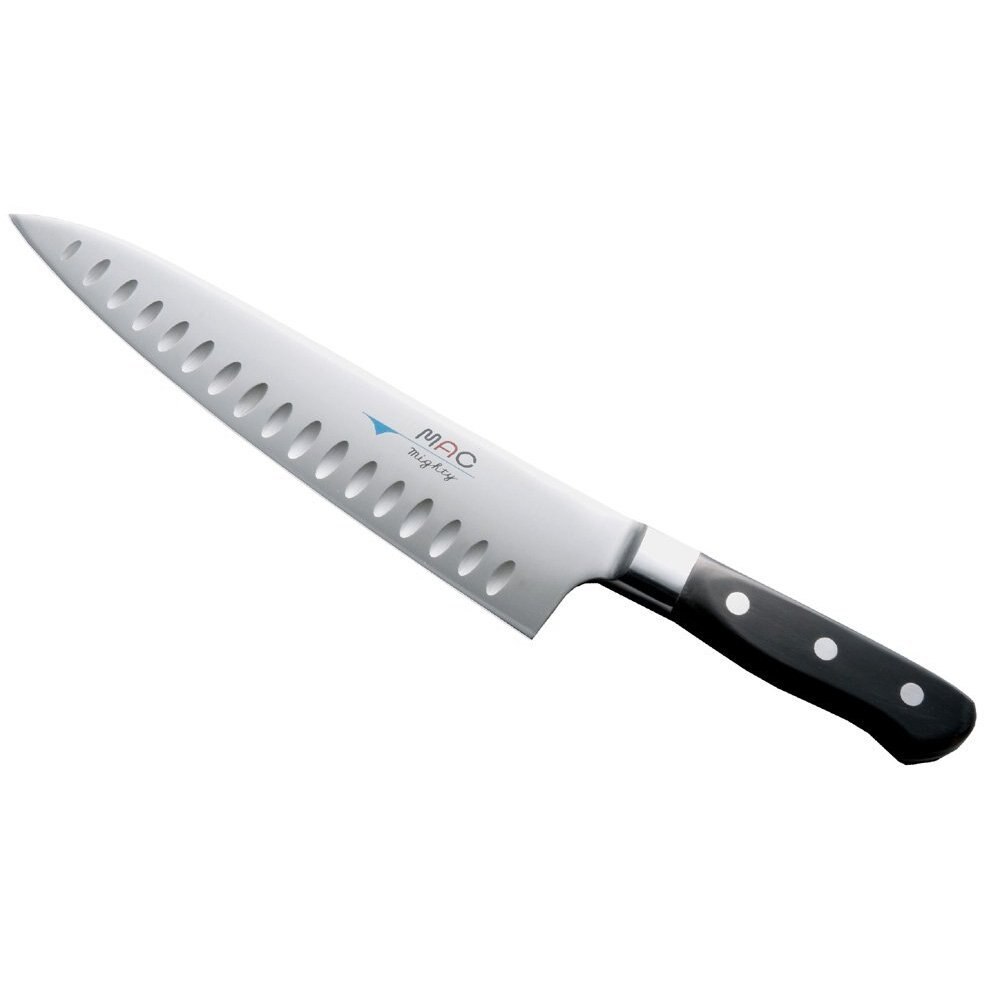
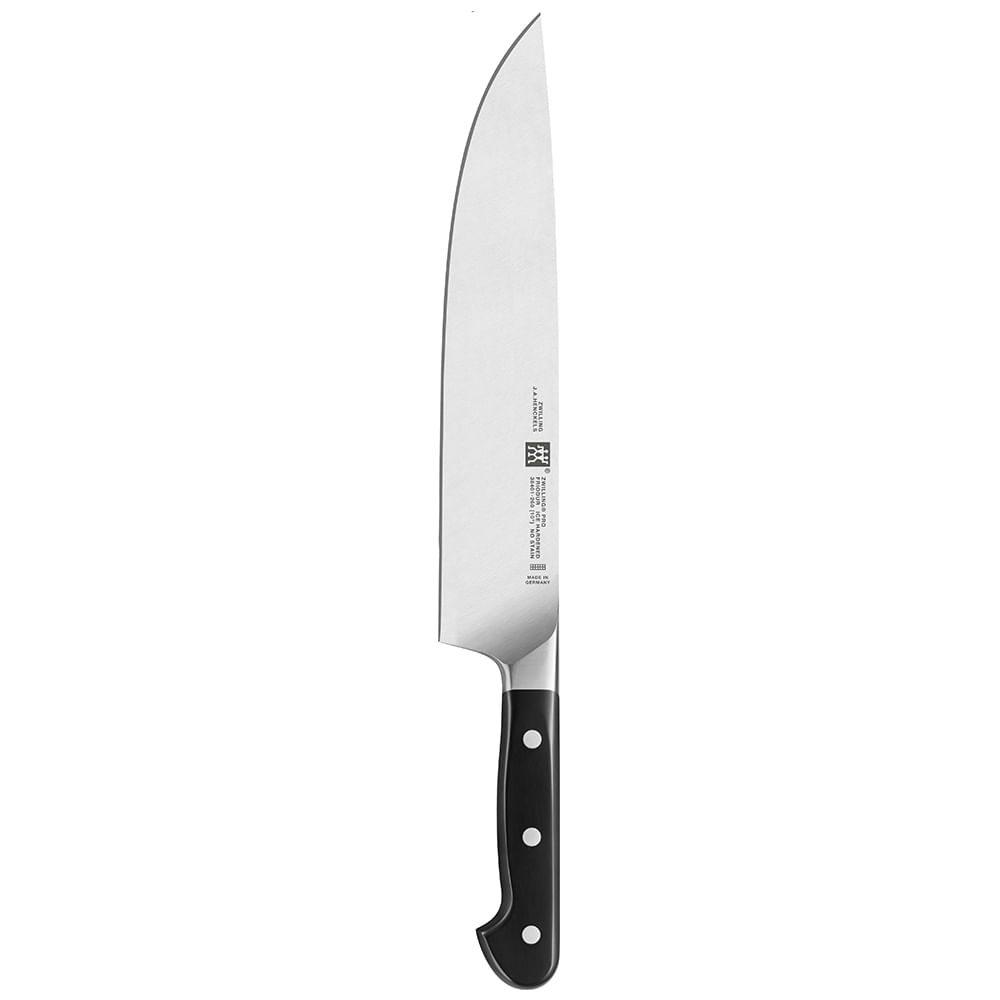
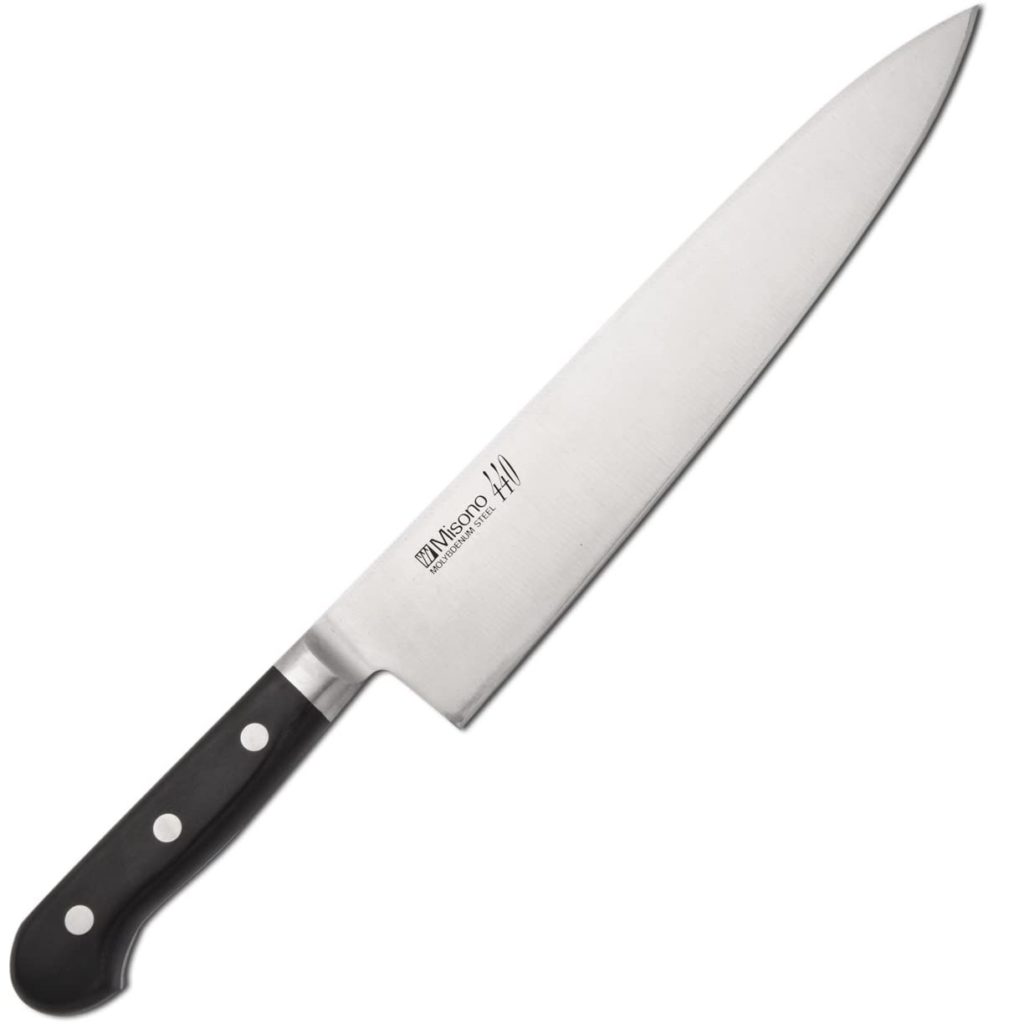
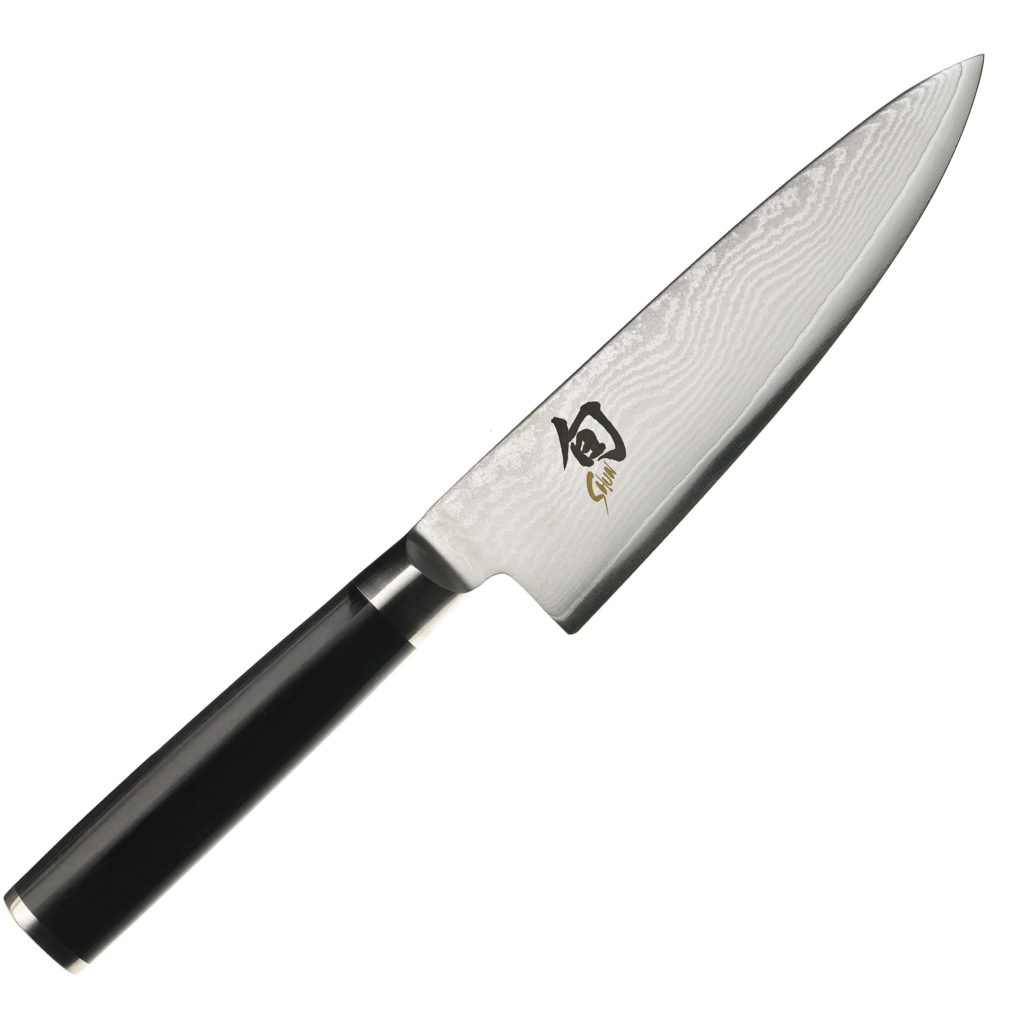
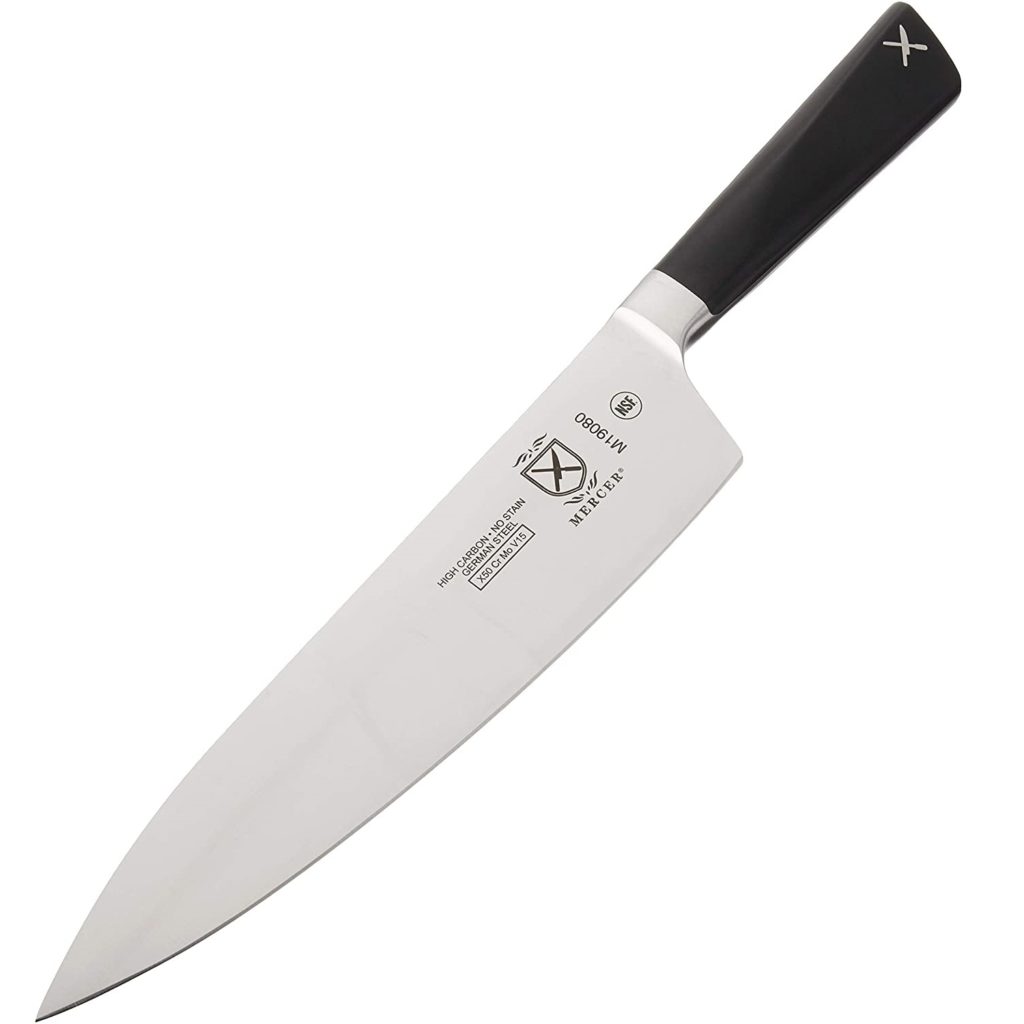
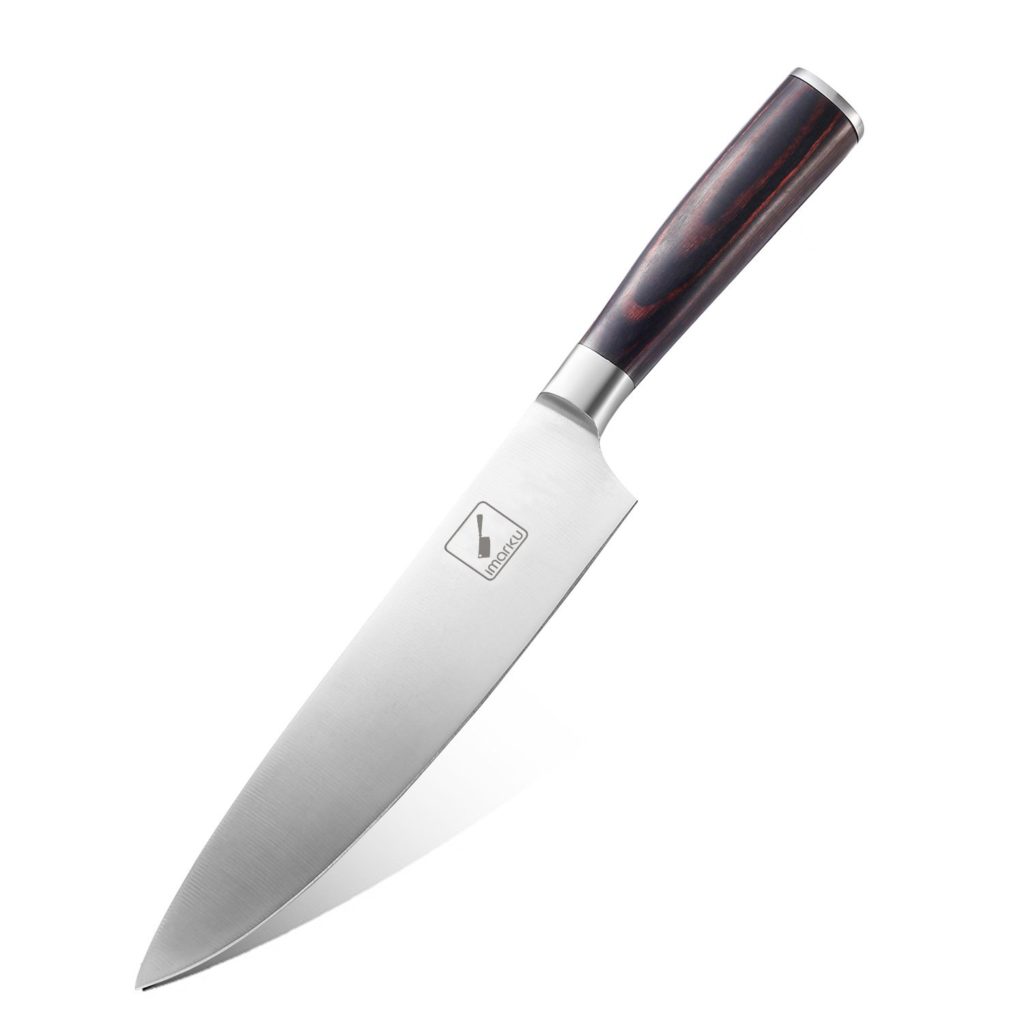
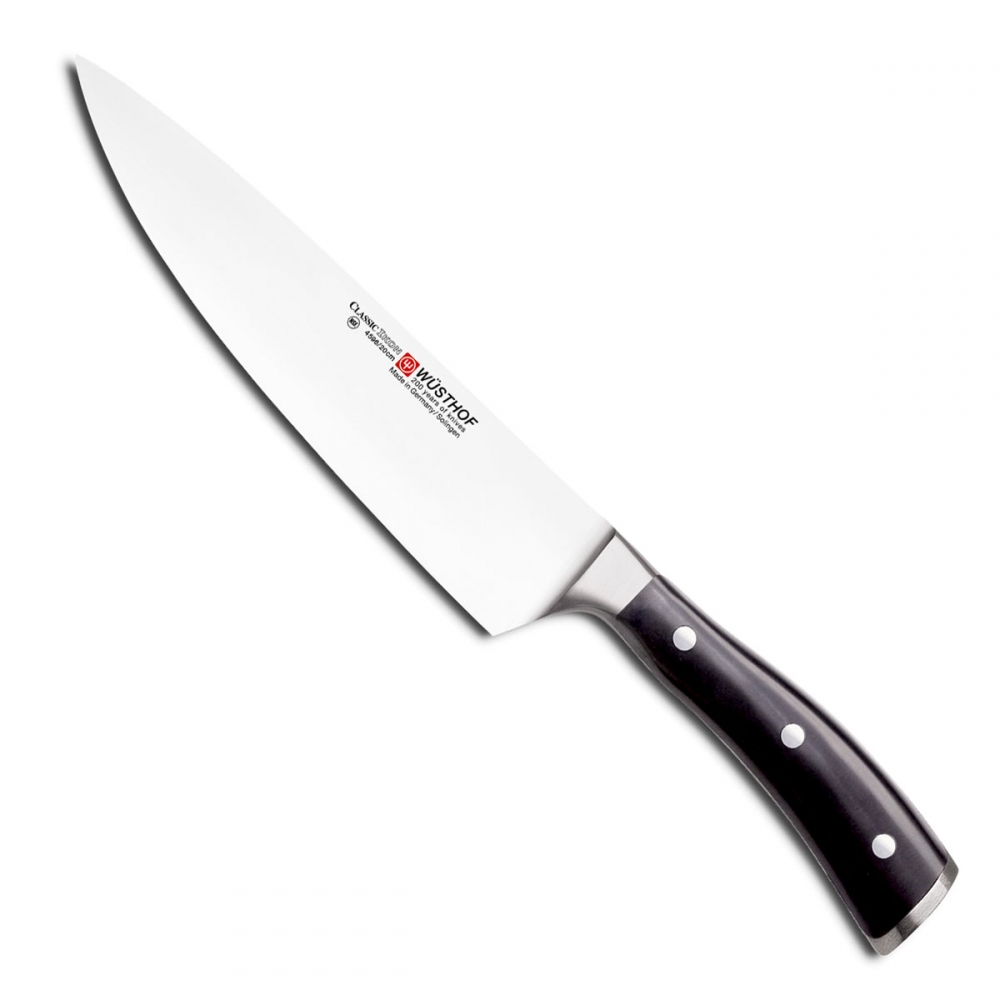
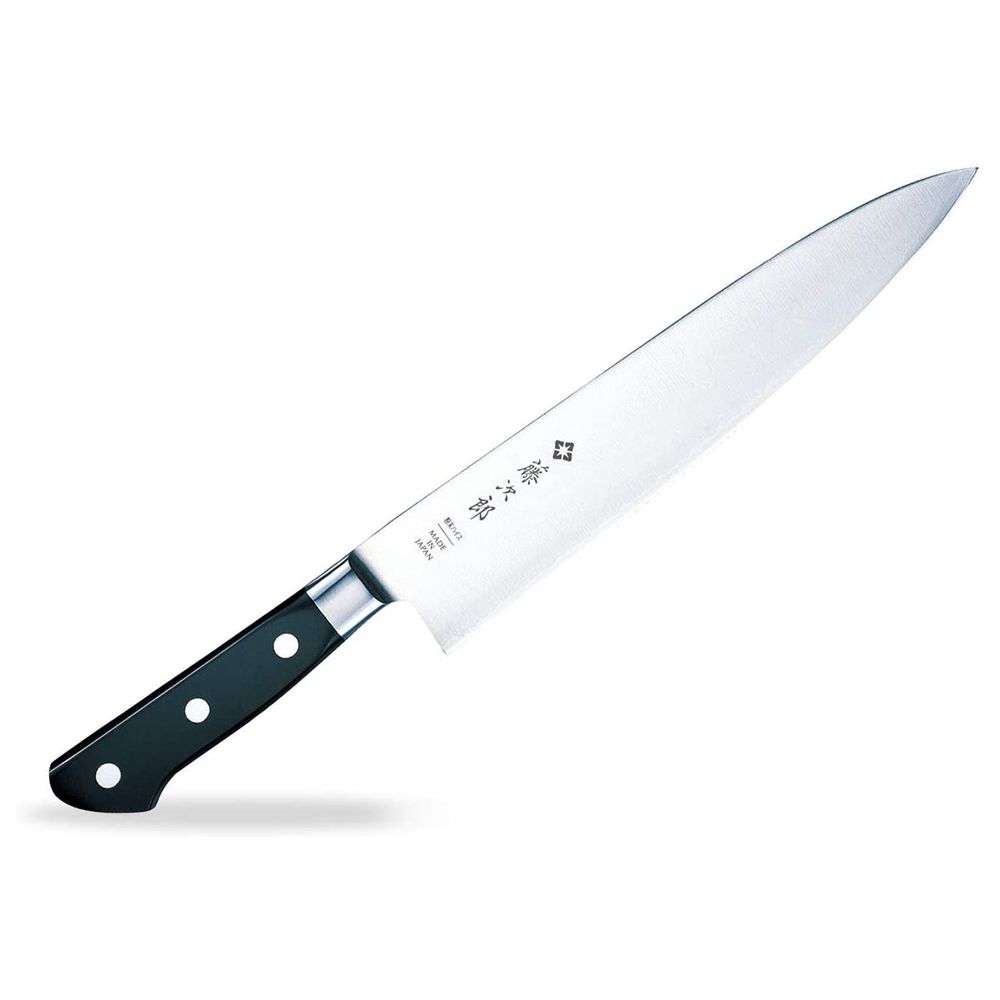
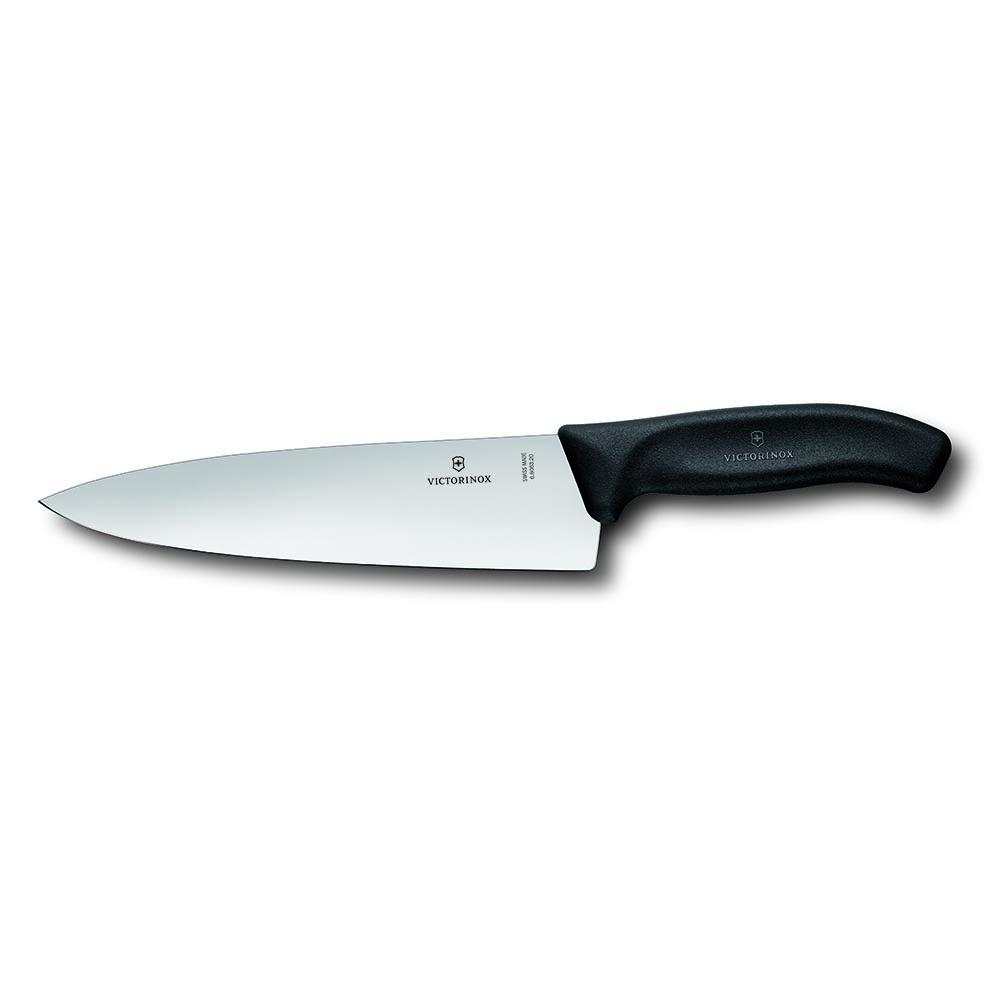

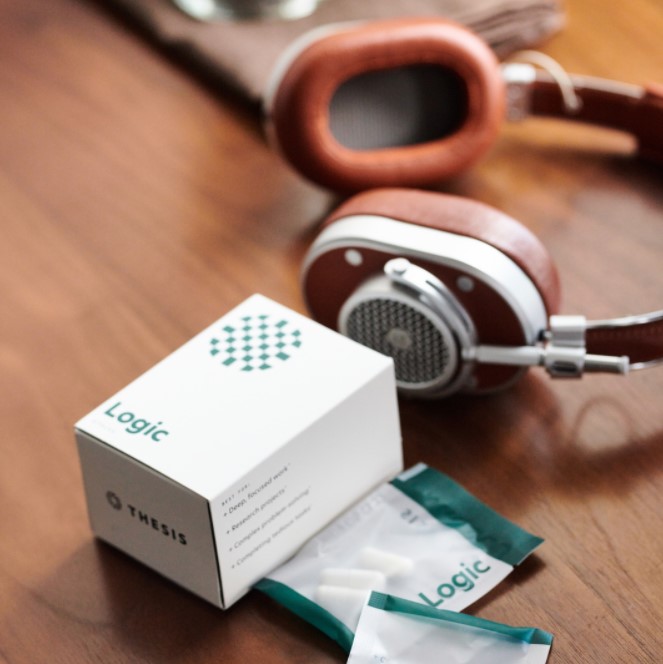

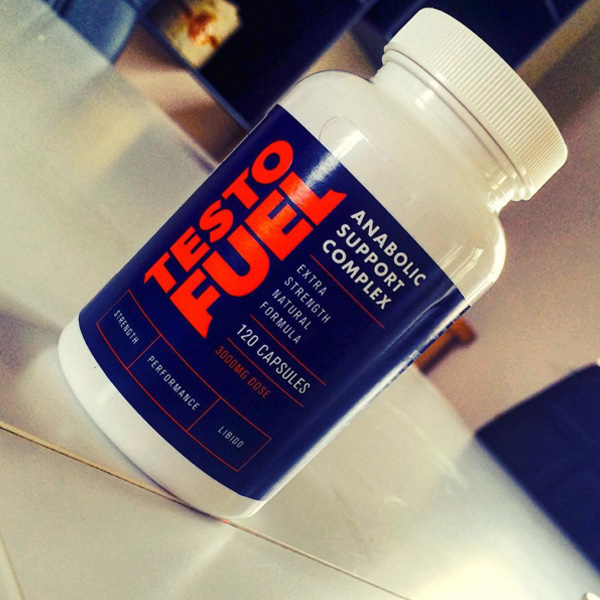
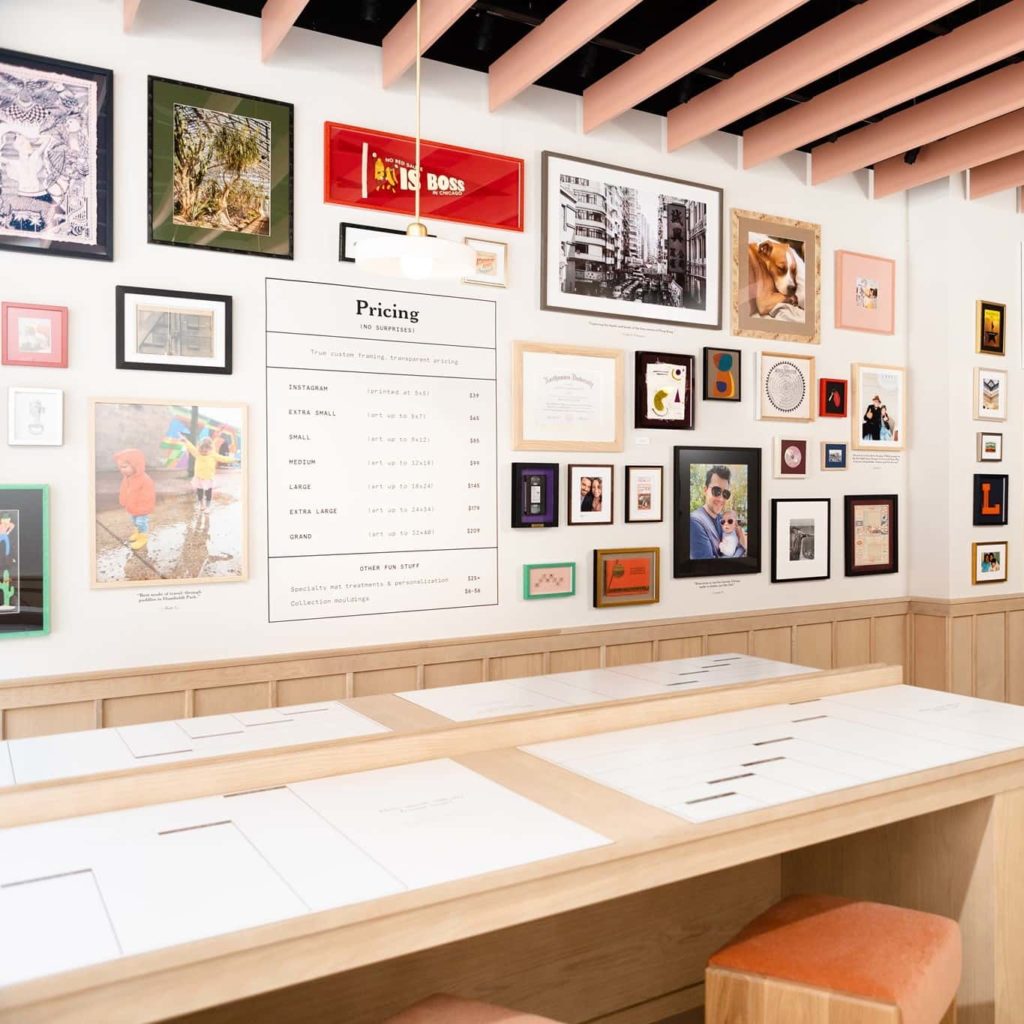
Ask the community or leave a comment
WRITE A REVIEWCustomer Reviews
Leave a review